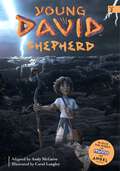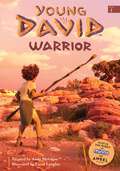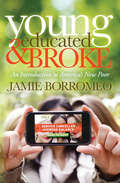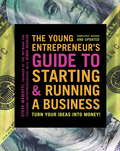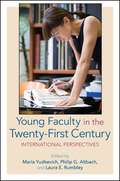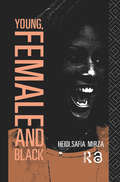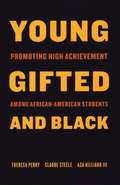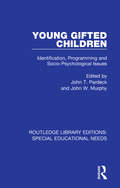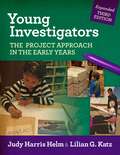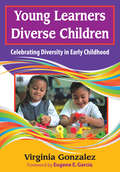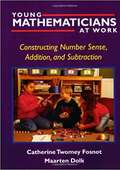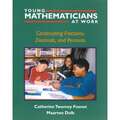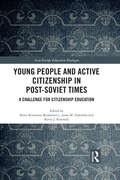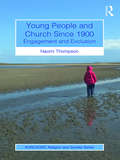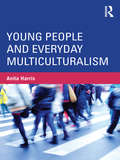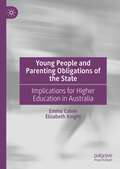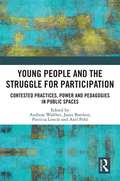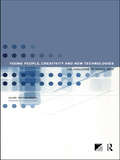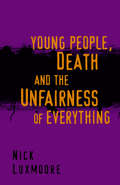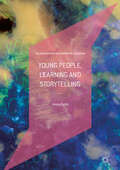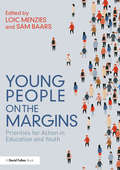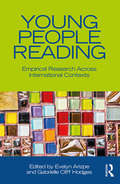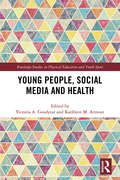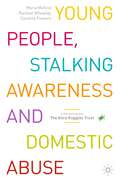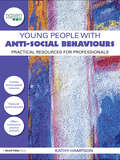- Table View
- List View
Young David: Shepherd
by Andy McGuireA Simon & Schuster eBook. Simon & Schuster has a great book for every reader.
Young David: Warrior
by Andy McGuireAdapted from the all-new Young David animated series and inspired by the upcoming feature length animated David film, Warrior is the first book in a highly illustrated, early reader chapter book series that imagines the life of a young shepherd, highlighting the courage and compassion that would one day make him God&’s chosen king of Israel.How can we defeat them when we&’re outnumbered ten to one?! Repeat after me . . . Chazak Amats! Be Strong and Courageous! This is the war cry young David carries into every battle he faces. But today&’s enemy is not what he expected. What starts out as playtime becomes one of his most important battles yet when the life of his most vulnerable sheep is on the line. Will David&’s great courage and strong faith in God be enough to defeat this fierce enemy? King David was one of the greatest leaders in history. His legacy has endured for thousands of years . . . but how did it all begin? Adapted from the all-new Young David animated series streaming on Minno Kids, and inspired by the feature length animated David film coming Summer 2025, this early reader, highly illustrated chapter book series imagines the life of a young shepherd, highlighting the character traits that would one day make him God&’s chosen king of Israel. Imagine what might have happened before the powerful Bible story of David in the Old Testament. Invite children to learn the values and virtues that made David a man after God&’s own heart through this inspirational children&’s book.
Young, Educated & Broke: An Introduction to America's New Poor
by Jamie BorromeoJamie Borromeo is a millennial (those born between the years 1980–2000) with a uniquely illuminating perspective on her generation and its interaction with the business, political, and social spheres. Young, Educated, and Broke, a travel journal memoir, is the intertwined journey in self-exploration of a young twenty-something and her millennial cohort in America. Borromeos social commentary takes the reader around the world to witness firsthand her path to personal growth, as she watches the tragedies and triumphs of her life mirror those of her generation. During the 2008 economic collapse and the years that followed, the author shares her emotional highs and lows and the insights gained. The author and the generation of America's New Poor struggle to find a sense of identity, purpose, and security. The questions begin to pile up: Will I pay back my student loans? Was the American Dream really a myth? Will I ever be able to attain financial freedom and security? While the generation as a whole is still grappling with these questions, Borromeos personal journey inward takes the reader through the answers the she herself has found. In her last destination on the Big Island of Hawaii, the author looks inward and finds answers that hold tremendous value for her life that may yet serve her generation in an even more profound way.
The Young Entrepreneur's Guide to Starting and Running a Business: Turn Your Ideas into Money!
by Steve MariottiThrough stories of young entrepreneurs who have started businesses, this book illustrates how to turn hobbies, skills, and interests into profit-making ventures. Mariotti describes the characteristics of the successful entrepreneur and covers the nuts and bolts of getting a business up, running and successful.
Young Faculty in the Twenty-First Century: International Perspectives (SUNY series in Global Issues in Higher Education)
by Maria Yudkevich; Philip G. Altbach; Laura E. RumbleyYoung faculty are the future of academia, yet without attractive career paths for young academics, the future of the university is bleak. Featuring case studies from Brazil, China, France, Germany, India, Norway, Portugal, Russia, South Africa, and the United States, Young Faculty in the Twenty-First Century is the first book to analyze issues facing early-career higher education faculty in an international context. The contributors discuss how young academics are affected by contracts, salaries, the structure of careers, and institutional conditions. The analyses cover the full spectrum of the academic profession, including part-time jobs and short-term contracts, both in public and private institutions. The book also addresses what universities must do in order to attract young, qualified candidates.
Young, Female and Black
by Heidi Safia MirzaYoung black women bear all the hallmarks of a fundamentally unequal society. They do well at school, contribute to society, are good efficient workers yet, as a group they consistently fail to secure the economic status and occupational prestige they deserve. This book presents a serious challenge to the widely held myth that young black women consistently underachieve both at school and in the labour market. In a comparative study of research and writig from America, Britain and the Caribbean Young, Female and Black re-examines our present understanding of what is meant by educational underachievement, the black family and, in particular, black womanhood in Britain.
Young, Gifted and Black
by Claude Steele Theresa Perry Asa HilliardYoung, Gifted, and Black is a unique joint effort by three leading African-American scholars to radically reframe the debates swirling around the achievement of African-American students in school.In three separate but allied essays, Theresa Perry, Claude Steele, and Asa Hilliard place students' social identity as African-Americans at the very center of the discussion. They all argue that the unique social and cultural position Black students occupy, in a society which often devalues and stereotypes African American identity, fundamentally shapes students' experience of school and sets up unique obstacles. And they all argue that a proper understanding of the forces at work can lead to practical, powerful methods for promoting high achievement at all levels.Theresa Perry argues that African-American students face dilemmas, founded in the experience of race and ethnicity in America, that make the task of achievement distinctive and difficult. (For instance: "How do I commit myself to achieve, to work hard over time in school, if I cannot predict when or under what circumstances this hard work will be acknowledged and recognized?") She uncovers a rich and powerful African- American philosophy of education, historically forged against such obstacles and capable of addressing them, by reading African-American narratives from Frederick Douglass to Maya Angelou. She carefully critiques the most popular theoretical explanations for group differences in achievement. And she lays out how educators today-in a postcivil rights era-can draw on theory and on the historical power of the African-American philosophy and tradition of education to reorganize the school experience of African-American students. Claude Steele reports stunningly clear empirical psychological evidence that when Black students believe they are being judged as members of a stereotyped group rather than as individuals, they do worse on tests. He finds the mechanism, which he calls "stereotype threat," to be a quite general one, affecting women's performance in mathematics, for instance, where stereotypes about gender operate. He analyzes the subtle psychology of stereotype threat and reflects on the broad implications of his research for education, suggesting techniques-based again on evidence from controlled psychological experiments-that teachers and mentors and schools can use to counter stereotype threat's powerful effect. Asa Hilliard's ends essay, against a variety of false theories and misguided views of African American achievement, and focuses on actual schools and programs and teachers around the country that allow African-American students achieve at high levels, describing what they are like and what makes them work. Young, Gifted, and Black will change the way we think and talk about African American student achievement and will be necessary reading on this topic for years to come.
Young Gifted Children: Identification, Programming and Socio-Psychological Issues (Routledge Library Editions: Special Educational Needs #41)
by John T. Pardreck John W. MurphyFirst published in 1990. This study on special educational needs explores the identification of the gifted, research on gifted children and programmes, programming for young gifted children, and the socio-psychological implications of giftedness. This title will be of great interest to student teachers, teachers of special educational needs, and parents.
Young Investigators: The Project Approach in the Early Years (Early Childhood Education Ser.)
by Judy Harris Helm Lilian G. KatzNow in its Third Edition, Young Investigators provides an introduction to the project approach with step-by-step guidance for conducting meaningful investigation with young children. The authors have expanded their bestseller to include two new chapters, How Projects Can Connect Children with Nature and Project Investigations as STEM, and to provide more help to teachers of the youngest children (toddlers) and older children (2nd grade). The new edition also shows teachers how to use standards in the topic selection process and identifies activities and experiences that will help children grasp key concepts and skills. Throughout the text, readers listen to teachers' concerns, witness how they find solutions to challenges, and experience how excited children become during project work. This book is appropriate for those new to using the Project Approach, as well as for teachers who already have experience with implementing the Project Approach. <P><P> Book features include: examples of projects from child care centers and preschool, K - 2, and special education classrooms; instructions for incorporating standards and STEM skills into project work; a variety of experiences to help children connect to the natural world; toddler projects that reflect knowledge from recent mind/brain research; tools for integrating required curriculum goals and for assessing achievement; a Teacher Project Planning Journal; and a study guide for pre- and inservice teachers.
Young Learners, Diverse Children: Celebrating Diversity in Early Childhood
by Virginia M. GonzalezNurture young children’s self-esteem and boost learning by integrating family culture with instruction! Emphasizing how connecting instruction with children’s backgrounds increases learners’ confidence and fosters a supportive learning environment, this book helps teachers improve outcomes for diverse and low socioeconomic status (SES) students. Drawing on field-tested methods, the author merges cognition, language, and culture and presents lesson plans, classroom-based alternative assessment tools, and best practices to help readers: Improve literacy through storytelling that reflects students’ lives; Collaborate with parents to increase student achievement; Correlate curriculum with TESOL standards for young children; Integrate academic standards across developmental levels.
Young Mathematicians At Work: Constructing Number Sense, Addition, And Subtraction
by Catherine Twomey Fosnot Maarten DolkIn our efforts to reform mathematics education, we've learned a tremendous amount about young students' strategies and the ways they construct knowledge, without fully understanding how to support such development over time. The Dutch do. So, funded by the NSF and Exxon, Mathematics in the City was begun, a collaborative inservice project that pooled the best thinking from both countries. In Young Mathematicians at Work, Catherine Fosnot and Maarten Dolk reveal what they learned after several years of intensive study in numerous urban classrooms. The first in a three-volume set, Young Mathematicians at Work focuses on young children between the ages of four and eight as they construct a deep understanding of number and the operations of addition and subtraction. Rather than offer unrelated activities, Fosnot and Dolk provide a concerted, unified description of development, with a focus on big ideas, progressive strategies, and emerging models. Drawing from the work of the Dutch mathematician Hans Freudenthal, they define mathematics as "mathematizing" - the activity of structuring, modeling, and interpreting one's "lived world" mathematically. And they describe teachers who use rich problematic situations to promote inquiry, problem solving, and construction, and children who raise and pursue their own mathematical ideas. In contrast to other books on math reform, Young Mathematicians at Work provides a new look at the teaching of computation. It moves beyond the current debate about algorithms to argue for deep number sense and the development of a repertoire of strategies based on landmark numbers and operations. Sample minilessons on the use of the open number line model are provided to show you how to support the development of efficient computation.
Young Mathematicians at Work: Constructing Fractions, Decimals, and Percents
by Catherine Twomey Fosnot Maarten DolkIn our efforts to reform mathematics education, we've learned a tremendous amount about young students' strategies and the ways they construct knowledge, without fully understanding how to support such development over time. The Dutch do. So, funded by the National Science Foundation and ExxonMobil, Mathematics in the City was begun, a collaborative inservice project that pooled the best thinking from both countries. In Young Mathematicians at Work, Catherine Fosnot and Maarten Dolk reveal what they learned after several years of intensive study in numerous urban classrooms. In this third volume in a series of three, Fosnot and Dolk focus on how children in grades 5-8 construct their knowledge of fractions, decimals, and percents. Their book: - describes and illustrates what it means to do and learn mathematics. - contrasts word problems with true problematic situations which support and enhance - investigation and inquiry. - provides strategies to help teachers turn their classrooms into math workshops. - explores the cultural and historical development of fractions, decimals, and their equivalents and the ways in which children develop similar ideas and strategies. - defines and gives examples of modeling, noting the importance of context. - discusses calculation using number sense and the role of algorithms in computation instruction. - describes how to strengthen performance and portfolio assessment. - focuses on teachers as learners by encouraging them to see themselves as mathematicians.
Young People and Active Citizenship in Post-Soviet Times: A Challenge for Citizenship Education (Asia-Europe Education Dialogue)
by Beata Krzywosz-Rynkiewicz Anna M. Zalewska Kerry J. KennedySituated within the context of "post-soviet times", this book explores young people’s citizenship activities and values in three distinct environments: post-soviet union countries, post-soviet union satellites, and countries that were independent of the soviet-union. Its purpose is to investigate the influence of these contexts on the ways young people see their citizenship in what are now emerging democracies. The future of nations depends to a large extent on whether citizens will continue to support existing values and will engage in activities to support those values. Using a framework designed by Kennedy (2006) and further developed by Zalewska, Krzywosz-Rynkiewicz (2011) the study examined the citizenship values of 3794 students aged 11-14-18 from 11 European countries. The main themes of this book include exploring similarities and differences in citizenship activities within countries and across countries; advancing explanations for these similarities and differences; highlighting the importance of contexts that influence citizenship activities and values; and assessing the extent to which democratic values are reflected in young people’s citizenship activities.
Young People and Church Since 1900: Engagement and Exclusion (AHRC/ESRC Religion and Society Series)
by Naomi ThompsonWhen the Sunday School pioneers saw a need in their communities in the late eighteenth century, their response provoked a 200 year movement. These early Sunday Schools met a clear social need: that for basic education. By the 1960s, they faced rapid decline – a rigid institution amidst societal change. Over recent decades, Christian youth work has emerged as a response to further youth decline within churches. Many youth workers engage with young people’s self-perceived needs by delivering open-access youth provision in their local communities alongside more specifically Christian activities. Tensions emerge over whether the youth worker’s role is to serve community or church needs, with churches often emphasising the desire to see young people in services. Drawing together historical and contemporary research, Young People and Church Since 1900 identifies patterns and change in young people’s engagement with organised Christianity across time. Through this, it provides a unique analysis of the engagement and exclusion of young people in three key time periods, 1900–1910, 1955–1972, and the present day. Whilst much commentary on religious decline has focused on changes external to churches, this text draws out the internal decisions and processes that have affected the longevity of Christianity in England. This book will be of interest to researchers and scholars of young people and Christianity in the twentieth century and today, as well as youth ministry students and practitioners and those interested in youth decline in churches more widely.
Young People and Everyday Multiculturalism (Critical Youth Studies)
by Anita HarrisUnlike as with previous generations, diversity and multiculturalism are engrained in the lives of today’s urban youth. Within their culturally diverse urban environments, young people from different backgrounds now routinely encounter one another in their everyday lives and negotiate and contest ways of living together and sharing civic space. What are their strategies for producing, disrupting and living well with difference, how do they create inclusive forms of belonging, and what are the conditions that militate against social cohesion amongst youth? This unique ethnography from education and cultural studies expert Anita Harris explores the ways young people manage conditions of cultural diversity in multicultural cities and suburbs, focusing particularly on how young people in the multicultural cities of Australia experience, define and produce mix, conflict, community and citizenship. This book illuminates rich, local approaches to living with difference from the perspective of a generation uniquely positioned to address this global challenge.
Young People and Parenting Obligations of the State: Implications for Higher Education in Australia
by Emma Colvin Elizabeth KnightThis book explores how the increasing need for specific kinds of parental engagement impacts care-experienced young peoples' trajectories. Previous Australian studies have found that care-experienced young people demonstrate poorer outcomes in health, education, and the criminal justice system throughout their life course. However, this multi-layered case study is the first to specifically address barriers in obtaining higher education—an effective tool for social mobility. In particular, the authors unpack how university marketing relies on young people to have a parent who understands tertiary education transitions to help them navigate post-school pathways to careers or higher education, as well as how policies might fail to help students who do not have such a figure in their lives. The authors offer suggestions for policy change in Australia while providing a basis for global comparisons and recommendations for how care-experienced young people and their support networks can overcome present challenges.
Young People and the Struggle for Participation: Contested Practices, Power and Pedagogies in Public Spaces
by Andreas Walther Janet Batsleer Patricia Loncle Axel PohlYoung People and the Struggle for Participation rethinks dominant concepts and meanings of participation by exploring what young people do in public spaces and what these spaces mean to them, individually and collectively. This book discusses how different spaces and places structure and are in turn structured by young peoples’ activities. Drawing on findings from a comparative study in eight European cities, insights into different styles of youth participation emerging from formal, non-formal and informal settings are presented. The book provides a comparative analysis of how transnational discourses, national welfare states and local youth policies affect youth participation. It also investigates how it comes about that young people get involved in different forms of participation in the course of their biographies. This book will appeal to academics, researchers and post-graduate students in the fields of youth studies, community studies, sociology of education, political science, social work, psychology and anthropology.
Young People, Creativity and New Technologies: The Challenge of Digital Arts
by Julian Sefton-GreenWhat is the creative potential of the new technologies? How can computers create new possibilities for artistic and creative work in education?Young People, Creativity and New Technologies describes ways in which ICTs (Information Communication Technologies) can produce new possibilities for creative work both within the formal curriculum and in complementary educational arenas. It provides a series of case studies which show how 'digital arts' are currently being used across school and community arts curricula and demonstrates how ICTs can be used in a genuinely inter-disciplinary way.It is aimed at those who are interested in practical ways to develop the creative uses of new technologies at school and in community arts settings.
Young People, Death and the Unfairness of Everything
by Nick LuxmooreA taboo subject in today's society, death is something that we do not like to talk about and especially do not like young people talking about. Yet, without opportunities to talk, young people's anxieties about death can manifest themselves in all sorts of self-destructive and socially-destructive ways. In this book, Nick Luxmoore explores the problems that arise when death is not openly discussed with young people and offers invaluable advice about how best to allay concerns without having to pretend that there are easy answers. He covers all of the key issues from the physicality of death to the fear of not existing to the way young people's morality develops and he provides expert insight into the impact these subjects have on young people's behaviour. This book presents a wealth of information for professionals, parents and others working with young people, providing the skills needed to ask young people the difficult question, "Do you think much about death?", and to support them as they begin their answer.
Young People, Learning and Storytelling (Palgrave Studies in Alternative Education)
by Emma ParfittThis book explores the lives of young people through the lens of storytelling. Using extensive qualitative and empirical data from young people’s conversations following storytelling performances in secondary schools in the UK, the author considers the benefits of stories and storytelling for learning and the subsequent emotional, behavioural and social connections to story and other genres of narrative. Storytelling has both global and transnational relevance in education, as it allows individuals to compare their experiences to others: young people learn through discussion that their opinions matter, that they are both similar to and different from their peers. This in turn can facilitate the development of critical thinking skills as well as encouraging social learning, co-operation and cohesion. Drawing upon folklore and literary studies as well as sociology, philosophy, youth studies and theatre, this volume explores how storytelling can shape the lives of young people through storytelling projects. This reflective and creative volume will appeal to students and scholars of storytelling, youth studies and folklore.
Young People on the Margins: Priorities for Action in Education and Youth
by Loic Menzies Sam BaarsOur society leaves too many young people behind. More often than not, these are the most vulnerable young people, and it is through no fault of their own. Building a fair society and an equitable education system rests on bringing in and supporting them. By drawing together more than a decade of studies by the UK’s Centre for Education and Youth, this book provides a new way of understanding the many ways young people in England are pushed to the margins of the education system, and in turn, society. Each contributor shares the personal stories of the young people they have encountered over the course of their fieldwork and practice, combining this with accessible syntheses of previous studies, alongside extensive analysis of national datasets and key publications. By unpicking the many overlapping factors that contribute to different groups’ vulnerability, the book demonstrates the need to understand each young person’s life story and to respond quickly and collaboratively to the challenges they face. The chapters conclude with action points highlighting the steps individuals, institutions and policy makers can take to bring young people in from the margins. Young People on the Margins showcases first-hand examples of where these young people's needs are being addressed and trends bucked, drawing out what can and must be learned, for teachers, leaders, youth workers and policy makers.
Young People Reading: Empirical Research Across International Contexts
by Evelyn Arizpe Gabrielle Cliff HodgesThe value of small-scale qualitative research projects into young people’s reading is often underestimated. Yet these finely tuned studies, with a precise focus and highly specialised approach, can provide us with profound insights into the richness and variety of young people’s reading practices. Bringing together contributors from six continents, this fascinating volume explores researchers’ experiences of investigating the reading habits, preferences and practices of young people aged 12–21. Detailing a variety of empirical methodologies and research methods, its chapters also consider reading in an array of contexts, in various languages and using diverse media. Key issues addressed in the book include: the complexity of sociocultural similarities and differences in young people’s reading in international contexts multilingual, bilingual and monolingual readers’ experiences of reading how young readers use a range of different print and digital media how our understanding of the range of texts available to young readers and the different contexts of and purposes for reading can be enhanced through small-scale qualitative research. Providing in-depth discussion of contributors’ research and findings, and touching on many different contexts, text types and media, this volume will support and inspire current and future researchers, lecturers and teachers interested in young people’s reading.
Young People, Social Media and Health (Routledge Studies in Physical Education and Youth Sport)
by Victoria Goodyear Kathleen ArmourThe Open Access version of this book, available at http://www.tandfebooks.com/doi/view/10.4324/9781351026987, has been made available under a Creative Commons Attribution-Non Commercial-No Derivatives 4.0 license The pervasiveness of social media in young people’s lives is widely acknowledged, yet there is little evidence-based understanding of the impacts of social media on young people’s health and wellbeing. Young People, Social Media and Health draws on novel research to understand, explain, and illustrate young people’s experiences of engagement with health-related social media; as well as the impacts they report on their health, wellbeing, and physical activity. Using empirical case studies, digital representations, and evidence from multi-sector and interdisciplinary stakeholders and academics, this volume identifies the opportunities and risk-related impacts of social media. Offering new theoretical insights and practical guidelines for educators, practitioners, parents/guardians, and policy makers; Young People, Social Media and Health will also appeal to students and researchers interested in fields such as Sociology of Sport, Youth Sports Development, Secondary Physical Education, and Media Effects.
Young People, Stalking Awareness and Domestic Abuse
by Maria Mellins Rachael Wheatley Caroline FlowersThis book addresses domestic abuse and stalking among young people in the UK and Ireland, with a focus on intersectionality and lifestyle settings. In partnership with the Alice Ruggles Trust, this book draws on a wealth of expert contributions including those with lived experience, frontline services such as Paladin National Stalking Advocacy Service, charities EmilyTest and Hollie Gazzard Trust, researchers of so-called honour-based abuse and online harms, and forensic psychologists who work with people who stalk. It begins with an overview of ways to recognise harmful behaviours, including those carried out online. The discussion then moves on to methods and motivations of stalking and coercive control and the various lifestyle contexts including education environments, young people in the workplace, and the role of the police and frontline support services in tackling these issues. It is a vital resource for undergraduate students across criminology, sociology, law, psychology, education, social justice, policing, and forensic psychology, as well as a combination of academic researchers and professionals working within stalking and domestic abuse support and prevention. This action-orientated book also includes 'Key Points' and ‘Discussion Questions’ in each chapter to direct student learning in the classroom and to create discussion points for wider readers.
Young People with Anti-Social Behaviours: Practical Resources for Professionals (nasen spotlight)
by Kathy HampsonThe media today suggests that many young people are becoming involved in anti-social behaviour. But increasing amounts of legislation and ASBOs neither seem to have addressed the real issues nor solved the problem, and may simply add to the frustrations of all those involved. Kathy Hampson’s comprehensive guide is based on up-to-date, grass-roots experience of working with young people with anti-social behaviour. Including ready-to-use, photocopiable resources suitable for a wide variety of settings, it examines the background to these highly topical issues, enabling the reader to contextualise and better identify with the problems faced by the young people they work with. The easy-to-reproduce, tried-and-tested exercises: are for use with individuals or groups address the issues involved in offending behaviour can be easily modified to cater for a range of learning styles, abilities and maturity, (and shows how you can identify which exercises suit which young people) include discussion scenarios, worksheets, cartoons, card games and creative activities can be used to dissuade young people from getting involved in anti-social behaviour, and to enable them to make better decisions The book includes an appraisal of current research on the issues surrounding anti-social behaviour and, in particular, risk factors that may be involved ‘behind the scenes’ in young people’s lives. A section on working with parents helps them to support their children, improve their parenting skills and to know where, and how, to ask for help. This is an essential resource offering constructive, practical solutions to anti-social behaviour in young people between the ages of 10 and 18. It will be invaluable for those working professionally or voluntarily in schools, with youth groups, youth offending teams, youth inclusion projects, faith groups, anti-social behaviour teams, or for anyone whose work offers the opportunity, or requires them, to challenge anti-social and offending behaviour.
